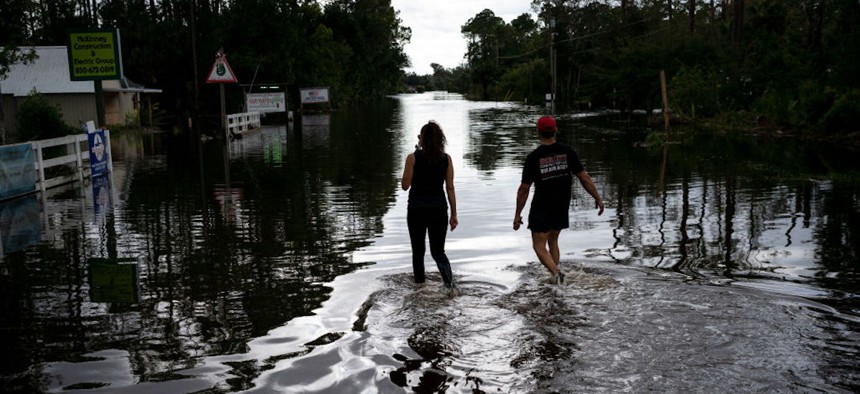Connecting state and local government leaders
By paying close attention to the vocabulary policymakers use to frame climate issues, they can more effectively build public support for climate mitigation.
It has been a record-breaking year in the U.S. for climate events: This summer was one of the hottest on record, and with four months to go in 2023, the U.S. has already broken the record for the most billion-dollar disasters in a calendar year.
All of this has made tackling climate change more urgent for state and local leaders. But amid political divides, many are struggling to build public support for the necessary mitigation policies. This, according to experts, is where an old adage comes into play: If you want people to understand you, speak their language.
The vocabulary surrounding climate initiatives, in other words, needs a refresh. By introducing terms like heat dome, red flag warning and megadrought, scientists have been getting the message out about the impending dangers of climate change, but policymakers also need to “communicate better about the crisis we’re in,” said Evan Westrup, communications director of the U.S. Climate Alliance, an organization of 25 governors advocating for climate action.
“The way [climate change is] written about is a huge part of that,” he said.
One reason climate messages may fail to elicit the intended response is because they are often jargon laden. If a policy or program name and description contains unfamiliar vocabulary or is too complex to be digested easily, then the public and other stakeholders may disregard it, Westrup said.
Climate change skeptics are “fighting against progress every single day, denying the science and delaying the action,” Westrup said. That’s why climate-related initiatives require “clear, concise language … for a better understanding of the solutions.”
Simply changing a word or two may make a big difference, he said.
A study released earlier this year from Yale University illustrates the effect a change in wording can have. It found that three similar terms describing emissions elicited different reactions. Survey respondents indicated that phrases like carbon emissions and carbon pollution carried negative connotations, as those words suggested harm to human and environmental health. The term greenhouse gas emissions, however, did not convey the same sense of urgency.
Another example is building decarbonization projects. The general public may not know what decarbonization means, Westrup said. "Decarbonization is a description of what it takes to achieve your goal.”
Instead, he suggests using simpler, more colloquial language to help the public more easily connect policies and programs with their benefits. In other words, use clean buildings in place of building decarbonization.
Effective climate-related communication requires “a balance of tone,” Westrup said. Policymakers “need to raise the alarm, but also need to inspire and spur action.”
One way states have galvanized climate action is through cap-and-trade programs. First introduced in the 1990s, the initiatives cap emissions and allow organizations to trade emissions allowances. They create financial incentives for participants to adopt more energy-efficient building technologies and systems.
Washington state recast the concept by calling it a cap-and-invest program, in which organizations bid for emissions allowances during virtual auctions. With the switch, officials can help reduce unfavorable responses and present the emissions reduction program as an investment rather than a trade. It’s just one word, Westrup said, “but it’s one word that’s easier to digest, and that the general public is more likely to follow and understand.”
In some cases, the word climate may not need to be in a title at all, said Sarah Bodor, director of policy and affiliate relations at the North American Association for Environmental Education. For example, terms like community resilience—as in Baltimore’s Community Resiliency Hub Program that looks to build the city’s capacity to prepare for and respond to emergencies—are more palatable as they put “a more positive spin” on critical issues, which could help win over skeptics. Plus, broader climate-related phrases avoid pigeon-holing governments’ problems and solutions to a climate-only context, she said.
Policymakers should find ways “to not be constrained by a label but create their own in a more effective way when communicating with the public,” Westrup said. Legislation like the Biden administration’s Inflation Reduction Act, for example, "turns the argument that climate action hurts the economy on its head, by connecting new carbon pollution cutting policies and programs with economic gain," he explained.
“The most effective leaders are … recognizing the opportunity to communicate clearly about [climate] solutions … to make a better future for their constituents,” he said.
Editor's note: This story was changed Sept. 19 to correct quotes from Evan Westrup, communications director of the U.S. Climate Alliance.

NEXT STORY: States will soon be required to track post-welfare employment outcomes




